The 70-467 Exam Practice Questions and Answers are ideal for the aspring candiates to grab exceptional grades in Microsoft 70-467 Exam! The 70-467 Questions and Answers are developed using the latest updated course content and all the answers are verified to ensure phenoment preparation for the actual 70-467 Exam!
Vendor: Microsoft
Exam Code: 70-467
Exam Name: Designing Business Intelligence Solutions with Microsoft SQL Server 2012 Exam
QUESTION 181
You install SQL Server Integration Services (SSIS) and develop an SSIS project to load a data warehouse.
The project defines 10 parameters that have different values for the development, test and production environments. Some packages have additional parameters defined.
You plan to deploy the SSIS packages to one server.
The server will also host the production data warehouse.
You need to deploy and configure the packages.
Which three actions should you perform in sequence? (To answer, move the appropriate actions from the list of actions to the answer area and arrange them in the correct order.
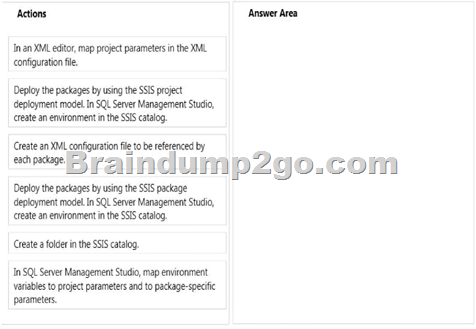
Answer:
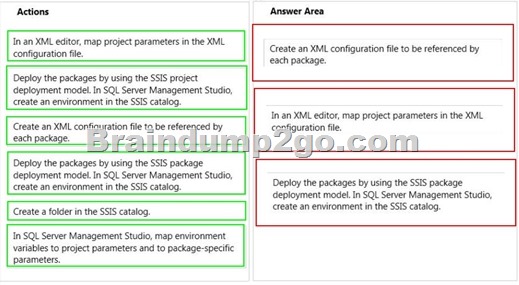
QUESTION 182
A company maintains separate environments for test, production, and quality assurance.
The company uses the project deployment model for SQL Server Integration Services (SSIS) deployments.
You create an SSIS project to perform a weekly refresh of the company’s data warehouse and cubes.
The project has three packages.
You need to configure the project to ensure so that the test and production teams can run each package without manually adding server-specific information.
Which program should you use? To answer, select the appropriate program in the answer area.
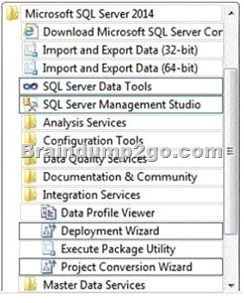
Answer:
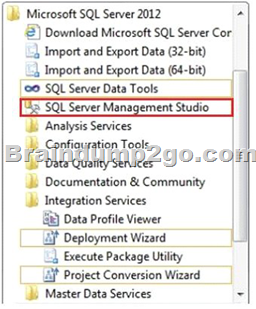
QUESTION 183
You have a business intelligence (BI) infrastructure.
You create a SQL Server Integration Services (SSIS) project that contains the packages for the BI infrastructure.
You need to automate the deployment of the SSIS project.
The solution must ensure that the deployment can occur as part of an unattended Transact-SQL script.
Which three actions should you perform in sequence? To answer, move the appropriate actions from the list of actions to the answer area and arrange them in the correct order.
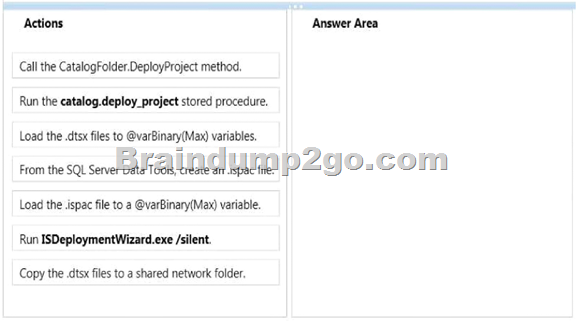
Answer:
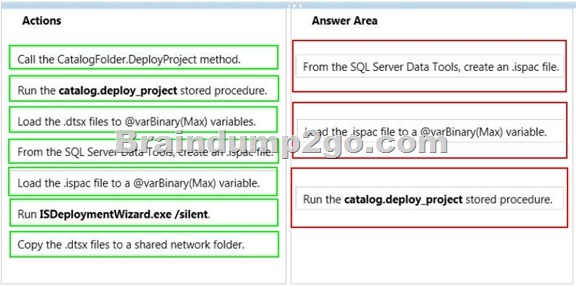
QUESTION 184
Your network contains a development environment, a staging environment, and a production environment.
You have a SQL Server Integration Services (SSIS) project.
All of the packages in the project load data from files in a shared network folder.
The packages use indirect XML configurations to set the location of the network folder.
The project is deployed to the three environments. Each environment has a different set of source files and a different network folder for the source files.
Currently, if an environment variable is missing, the package will use the network folder specified in the package, not the folder specified in the XML configuration file.
You need to ensure that each time a package is executed, the network folder location specified in the package is NOT used.
Which three actions should you perform in sequence? To answer, move the appropriate actions from the list of actions to the answer area and arrange them in the correct order.
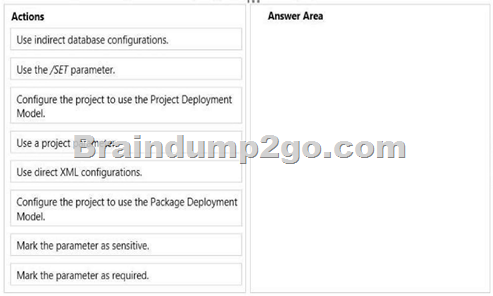
Answer:
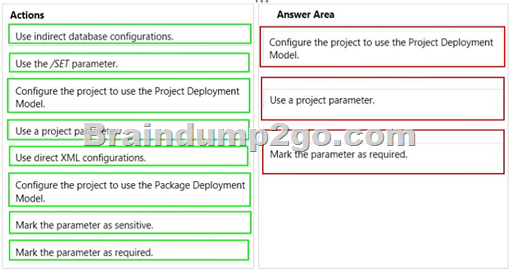
QUESTION 185
You are configuring an Excel Services service application in a Microsoft SharePoint farm.
Users will deploy Excel workbooks to SharePoint libraries that allow interaction with PivotTables through Excel Services. PivotTable data is sourced from secured SQL Server Analysis Services (SSAS) cubes and PowerPivot models inside published workbooks.
You need to ensure that users can refresh the PivotTables from within Excel Services without a warning message appearing.
What should you do? To answer, drag the appropriate term or terms to the correct location or locations in the answer area. (Use only terms that apply.)
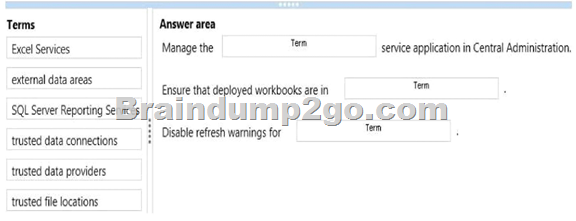
Answer:

QUESTION 186
You are developing a SQL Server Reporting Services (SSRS) solution.
You plan to create reports based on the results of a currency exchange SOAP web service call.
You need to configure a shared data source.
Which data source type should you use? To answer, select the appropriate type from the drop-down list in the answer area.
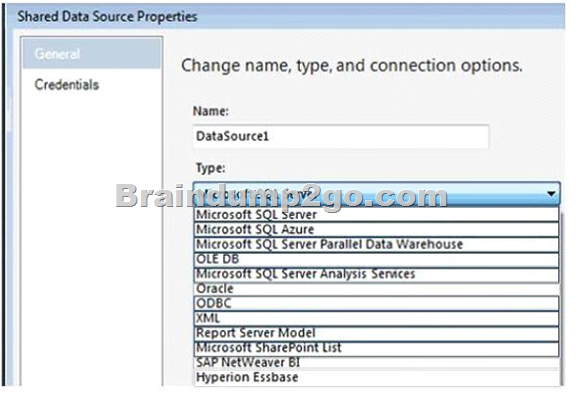
Answer:
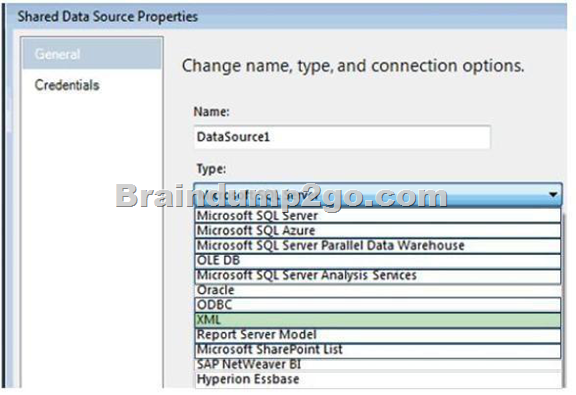
QUESTION 187
You are developing a SQL Server Analysis Services (SSAS) cube named Sales Planning.
The cube consists of two measure groups named Sales and Planning.
Each measure group is based on a data warehouse fact table and consists of a single MOLAP partition that has the same name as its measure group.
The Planning measure group consists of two measures:
– Forecast, which uses the Sum aggregate function
– Forecast Count, which uses the Count aggregate function
Users contribute planning values by using a legacy application.
An extract, transform, load (ETL) process is scheduled to periodically transfer the planning values from the database of the legacy application to the data warehouse.
Financial analysts query the Sales Planning cube and report that the planning values are sometimes out of date. A new company requirement mandates that the planning values be entered directly into the cube by using Microsoft Excel 2010 PivotTable What-If Analysis.
You need to write-enable the Planning partition.
What should you do before write-enabling the partition?
A. Set the ProcessingMode property of the Planning partition to LazyAggregations.
B. Set the Type property of the Planning measure group to Budget.
C. Remove the Forecast Count measure.
D. Convert the Planning measure group to a linked measure group.
E. Set the StorageMode property of the Planning partition to Rolap.
F. Set the ProcessingMode property of the Planning measure group to LazyAggregations.
Answer: C
Explanation:
A cube can be write-enabled only if all its measures use the Sum aggregate function.
QUESTION 188
A production SQL Server Analysis Services (SSAS) cube is processed daily.
The users query products by using a hierarchy named Products from a dimension named Product.
The DimProduct table in the data source view is used as the source of the Product dimension.
The table has the following structure.
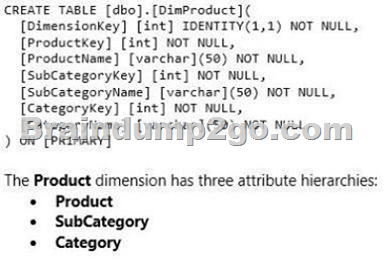
The Product dimension has three attribute hierarchies:
Product
Subcategory
Category
The attributes have the following relationships defined: Product > Subcategory > Category.
Each attribute has a key and a name sourced from the related key and name columns in the DimProduct table.
During processing, you receive the following error message:
‘Errors in the OLAP storage engine:
A duplicate attribute key has been found when processing:
Table: ‘dbo_DimProduct’,
Column:
‘SubCategoryKey1, Value:
“23′. The attribute is Subcategory’.”
You verify that the data is accurate.
You need to ensure that the dimension processes successfully.
What should you do?
A. Delete the Products hierarchy.
B. Relate the Subcategory and Category attributes directly to the Product attribute.
C. Remove the duplicate data from the DimProduct table.
D. Remove the Subcategory attribute.
Answer: B
QUESTION 189
Hotspot Question
You are developing a SQL Server Analysis Services (SSAS) cube that contains the data for a running team.
The data warehouse used by the cube contains the time durations of taps run by each runner on the team. The time durations are stored in seconds as an integer.
You need to build the following two measures in the cube:
– A measure named Measure1 that must contain the average time duration of the laps run by each runner.
– A measure named Measure2 that must contain the lap-time duration and the name of the runner who ran the fastest lap.
What should you do?
To answer, select the appropriate Aggregation Function property for each measure in the answer area.
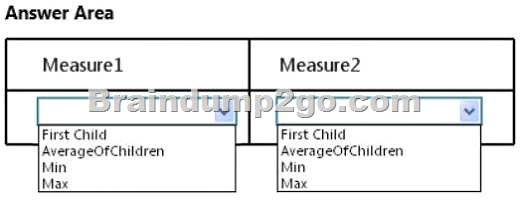
Answer:
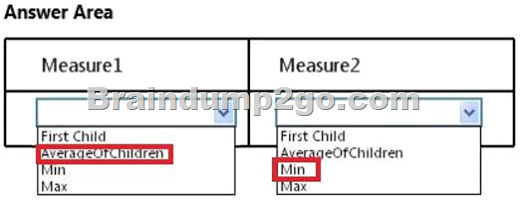
Braindump2go New Updated 70-467 Exa Dumps are Complete Microsoft 70-467 Course Coverage! 100% Real Questions and Correct Answers Guaranteed! Updated 70-467 Preparation Material with Questions and Answers PDF Instant Download:

